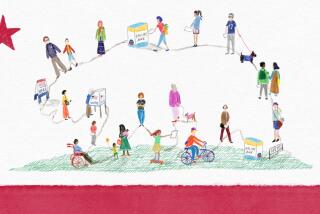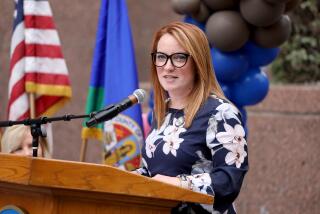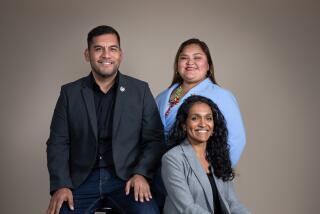Op-Ed: How to fight government by money in L.A.
This month Los Angeles voters — at least the sliver of the electorate that managed to vote — approved two ballot measures that moved the date of city elections from the spring of odd-numbered years to the November of even-numbered ones. The rescheduled elections will now coincide with those for president and governor — contests with far greater voter participation.
If anything, the move was overdue. The number of Angelenos voting in city elections peaked in 1969, when incumbent Mayor Sam Yorty won reelection by terrifying just enough white voters at the prospect that his challenger, Councilman Tom Bradley, would win and hand the keys of the city to the Black Panthers. So effective was Yorty at scaring credulous whites that the number — let alone the percentage — of city voters hasn’t been equaled since, even though there are 1 million more Angelenos today than there were in 1969.
The last several city elections have seen steadily lower record-low turnouts. The voters’ decision to consolidate them with higher-turnout elections made very good sense.
Still, critics of the move made one compelling argument against it: By greatly enlarging the number of likely voters, moving the elections almost surely will make campaigning for city office much more expensive. Campaign mail will have to be sent to a far larger number of potential voters; much more time on TV and radio will have to be purchased if the ads for city candidates are even to be noticed amid the flood of advertising for statewide candidates. Big money will play an even more outsized role in local elections and in influencing the decisions of Los Angeles government. And the growing dominance of government by money is an even greater threat to our democracy than low voter turnout.
There are two ways, however, that Angelenos can offset the increasing power of money in city politics. The first is to make City Council districts smaller. The second is to improve the city’s system of publicly financing campaigns.
Currently, Los Angeles has 15 council districts, each home to roughly 260,000 residents. Even apart from the rising costs of seeking office in districts so large, the sheer size of the districts augurs poorly for local democracy. The city’s 4th Council District, for instance, runs from Los Feliz down to Mid-Wilshire, then over the Cahuenga Pass and west to Sherman Oaks. The concerns of voters in such a district are likely to be as dissimilar as their neighborhoods. Unseating an incumbent in a district that has so little in common with itself would probably prove exceptionally challenging.
Were Angelenos to treble the number of council seats to 45, they would create districts that were smaller (85,000 to 90,000 residents), more compact, with clearer political concerns and identities, and, above all, less expensive to run in and win. Of course, creating more council members at a time when government’s reputation is only marginally higher than ax murderers’ may well prove a heavy lift. The actual cost of such a change to the city could be held down by reducing the number of each council member’s field representatives — smaller districts should necessitate smaller staffs — but such a move would still cost taxpayers more money.
At the same time, however, creating smaller districts would not only diminish the influence of major donors over local pols, but also give community activists more power. That shift could be made stronger still by amending Los Angeles’ campaign finance laws. Currently, those laws enable candidates to collect $4 in public matching funds for every $1 they raise from city residents. To enhance even more the ability of small donors to influence elections, that law could be amended to increase the ratio of matching funds from 4 to 1 to 10 to 1 for donations not exceeding $200.
Democracy doesn’t come cheap, but that doesn’t mean government must be controlled by the highest bidders. Los Angeles voters affirmed their desire for a more representative democracy when they voted to move the city’s election days. To make Los Angeles’ democracy more vibrant yet, they need to create smaller districts and offer more public financing of campaigns. The mounting pressures of plutocracy demand no less.
Harold Meyerson is the editor-at-large of the American Prospect and an op-ed columnist for the Washington Post.
Follow the Opinion section on Twitter @latimesopinion and Facebook
More to Read
A cure for the common opinion
Get thought-provoking perspectives with our weekly newsletter.
You may occasionally receive promotional content from the Los Angeles Times.










